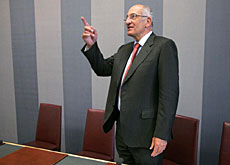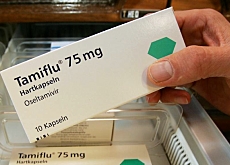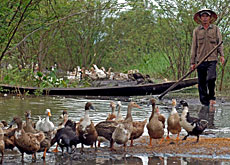Couchepin criticises bird flu hysteria

Swiss Interior Minister Pascal Couchepin, who has the health portfolio, has criticised the "hysteria" surrounding a bird flu pandemic.
He assured the Swiss public on Wednesday that the government had taken adequate precautions against the threat.
Couchepin said not a single person in Europe has contracted the disease. He also defended the Swiss authorities, which he believed had reacted rationally and appropriately given the available data.
He said that it was necessary to differentiate bird flu, which is an animal disease, from seasonal flu, which affects humans.
Couchepin explained that the bird flu virus first had to mutate before it could cross to humans. He described this as theoretically possible but unlikely.
Switzerland banned poultry imports from countries affected by bird flu, including Turkey and Romania.
Other precautions include recommendations for poultry farmers, increased border checks and a monitoring programme for wild birds.
Also on Wednesday a key parliamentary committee demanded that the government sort out the distribution issues regarding antiviral treatment as soon as possible.
The committee said the government should admit that the problem is not completely under control.
Well prepared
The head of the Federal Health Office, Thomas Zeltner, said Switzerland was well prepared for bird flu.
He said the authorities were also bracing themselves for a worst-case scenario of a highly contagious human strain of bird flu.
“The question is not whether there will be a pandemic, but when and how strong it will be.”
Zeltner added that the stockpile of an anti-viral drug for two million people in Switzerland is almost completed.
He added that questions remained over the distribution of the Tamiflu drug, and the creation of a vaccine.
Information policy
Zeltner admitted that his office could have done a better job of communicating with the public and of convincing them that there is no need to panic.
He said the cabinet had decided to hold regular media briefings on the issue and limit the number information officers.
The head of the Federal Veterinary Office, Hans Wyss, reiterated that there was no major risk of the H5N1 virus reaching Switzerland through wild birds from the Balkans and Russia.
He said there was no need at the moment to impose restrictions on free-range poultry farms in Switzerland.
Tamiflu sales
In another development, Swiss pharmaceutical company Roche said third-quarter sales rose 20 per cent to SFr8.82 billion ($6.79 billion) on demand for cancer drugs and Tamiflu.
While cancer drugs were the biggest contributor to growth in the quarter, Tamiflu sales more than doubled to SFr279 million from SFr110 million, the company said on Wednesday.
Roche, which is under growing international pressure to ease its control on the manufacture of Tamiflu, maintains it will not release its patent, which expires in 2016. However, it announced on Tuesday it could allow rival firms to manufacture Tamiflu.
swissinfo with agencies
The H5N1 strain first emerged in Hong Kong in 1997, when it caused the death or destruction of 1.5 million birds. Eighteen people fell ill, of whom six died.
It re-emerged in 2003 in South Korea and has spread to several Asian countries including China, Vietnam, Cambodia, Thailand, Laos and Indonesia.
This summer it also appeared in Russia and Kazakhstan, and in the past few days in Turkey and Romania.
So far H5N1 has killed at least 60 people.
Vaccines effective against a pandemic virus are not yet available. Antiviral drugs, such as Tamiflu, are the only medical defence.
Vaccines are produced each year for seasonal influenza but will not protect against pandemic influenza.
Although a vaccine against the H5N1 virus is being developed in several countries, no vaccine is ready for commercial production and no vaccines are expected to be widely available until several months after the start of a pandemic.

In compliance with the JTI standards
More: SWI swissinfo.ch certified by the Journalism Trust Initiative



You can find an overview of ongoing debates with our journalists here. Please join us!
If you want to start a conversation about a topic raised in this article or want to report factual errors, email us at english@swissinfo.ch.